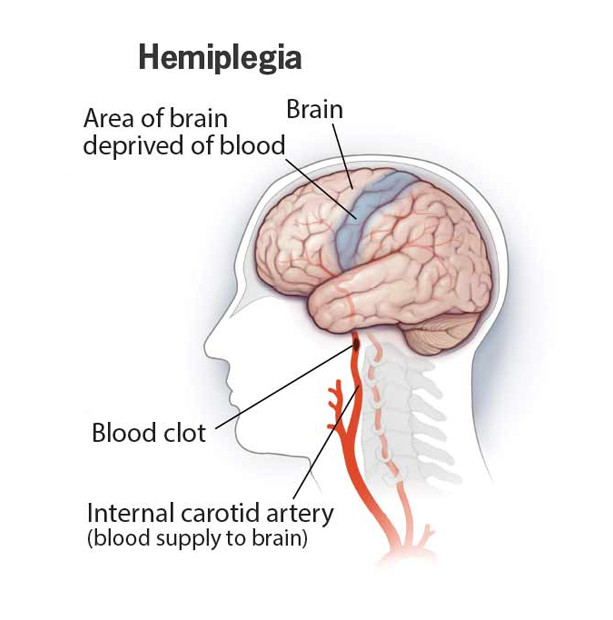The word ‘plegia‘ means weakness so severe that it is nearly complete. ‘Hemi‘ implies one side of the body. Hence, ‘hemiplegia‘ means complete paralysis of one half of the body, including one arm and leg. Any disease or injury in the motor centers of the brain can cause hemiplegia.
Hemiplegia is a more severe form of ‘hemiparesis‘ wherein one half of the body is only weakened.
CAUSES OF HEMIPLEGIA
Many conditions give rise to hemiplegia. Generally, an injury to the right side of the brain will cause a left-sided hemiplegia while an injury to the left side of the brain will cause a right-sided hemiplegia.
- Stroke: is the commonest cause of hemiplegia. Insufficient blood supply to the brain leads to loss of brain functions. The stroke may be caused by:
- A clot formed within the blood vessel blocking the blood supply’-> a thrombus
- A thrombus breaks away from its site of origin and forms a block elsewhere in the circulation. -> an emboli
- A bleed from a blood vessel supplying the brain -> a hemorrhage
- Head injury
- Diabetes
- Brain tumor
- Infections- meningitis, encephalitis
- Migraine syndrome- recurrent headaches of severe intensity occasionally accompanied by sensations of numbness and tingling in one half of the body.
- Inflammation of the blood vessels- vasculitis
SYMPTOMS OF HEMIPLEGIA
Injury or insults to the brain cells that control movements in one half of the body cause hemiplegia. Hence, symptoms largely depend upon the part of the brain affected. The same can be said about the severity of individual symptoms.
- Difficulty in walking.
- Problems in balance, losses balance when trying to walk
- Difficulty in swallowing
- Trouble with vision. Blurred vision or weakness of the eyes.
- Speech becomes difficult.
- Numbness, tingling or loss of sensations on one half of the body.
- Loss of control over bladder and bowel movements leading to an inability to hold on to stool or urine.
- Unable to perform tasks like holding objects, tying laces, dressing oneself, buttoning etc.
- Feeling depressed
- Heightened emotional sensitivity with inability to handle stressful situations.
- Memory seems poor. Unable to recall recent or past events concerning people, places and activities.
DIAGNOSIS
- Complete blood count.
- Blood biochemistry test.
- Cranial MRI – a non-invasive, highly sensitive procedure that uses electromagnetic properties of tissues providing detailed studies of their structures.
- An EEG (electroencephalogram) – can measure the nerve activity within the brain.
HOMEOPATHIC TREATMENT FOR HEMIPLEGIA
Homeopathy provides supportive treatment and prevents any further deterioration. Homeopathic medicines can prevent the paralytic muscles from further degeneration.
The medicines act at the level of the nervous system and facilitate proper conduction of signal impulses from the nerves to the muscles.
HOMEOPATHIC MEDICINES FOR HEMIPLEGIA
Some common medicines for hemiplegia and such states of paralysis are:
- Plumbum Metallicum: This medicine is sourced by processing and potentising the metal lead. It helps the neuro-muscular system of the body. It is administered with the intention to improve some muscles power. Plumbum met, as it is called, may be indicated all kinds of paralysis such as hemiplegia, paraplegia and quadriplegia. As said earlier, it cannot cure paralysis as such.
- Causticum: Similar to above medicine, Causticum is also a friend to all paralysis patients. It is aimed at improving some muscle power and not cure it.
- Nux vomica: This herbal medicine helps in the early stages of hemiplegia and not after some months or years.
- Lathyrus sativus : This is another example of a toxin transformed to medicine. It is safe, there is some spasticity and stiffness in some muscles, in the cases of hemiplegia, where Lathyrus may be called for.
- Gelsemium : This plant remedy is useful for early cases of paralysis including hemiplegia. It is supposed to improve the muscle strength in the cases of paralysis.
- Zincum met- Lameness, weakness, trembling and twitching of various muscles. Chilblains (Agar). Feet in continued motion; cannot keep still. Large varicose veins on legs. Sweaty. Convulsions, with pale face. Transverse pains, especially in upper extremity. Soles of feet sensitive. Steps with entire sole of foot on floor.
- Hypericum - -Feels as if lifted high in air, or anxiety lest he fall from heights. Mistakes in writing. Effects of shock. Melancholy. an icy cold hand. Throbbing in vertex; worse in close room Crawling in hand and feet. Lancinating pain in upper and lower limbs. Neuritis, with tingling, burning pain, numbness and flossy skin. Joints feel bruised. Hysterical joints.


